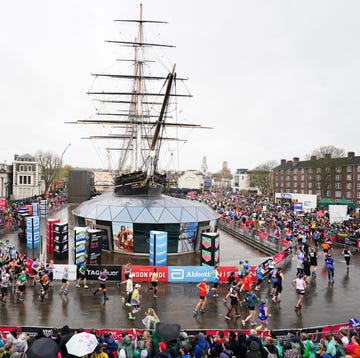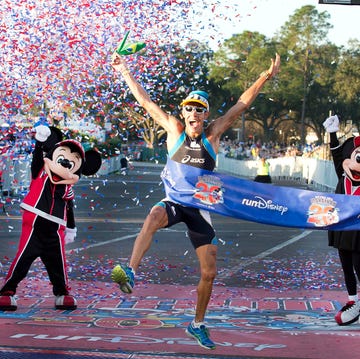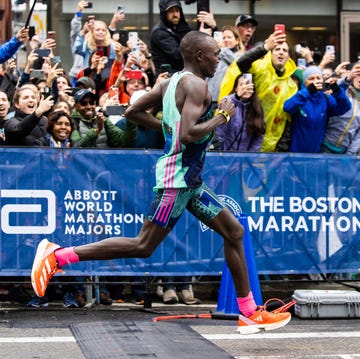In the past year, several marathon scandals have made headlines. In November, the first woman to cross the finish line at the Chickamauga Battlefield Marathon was disqualified after she registered an impossibly fast (3:37/mile) second-half split. Organizers determined that the apparent women’s victor at April’s St. Louis Marathon had not run the full course at the race two years in a row. And after this year’s Boston Marathon, members of the running community questioned how one Pennsylvania-based runner had achieved his qualifying time. While officials at his qualifying race acknowledged “his time may not be accurate,” they decided there was no evidence to warrant a disqualification.
Readers have had a spectrum of reactions to these stories—from “What a disgrace!” to “What’s the point of cheating?” to “Who cares?” Here’s what race directors and timing companies have to say.
How Common Is It?
The consensus in the industry is that not many people intentionally cheat at road races, but it does happen. New York Road Runners’ Peter Ciaccia, President of Events/NYC Marathon Race Director told Runner’s World Newswire that in 2014, about 50 of the 50,530 NYC Marathon finishers were removed from the results, most for accidental cheating (getting close enough to the finishing mat to register a time after dropping out, for example).
Marine Corps Marathon Deputy Director Angela Anderson says that in an average year, 150 to 200 runners might be removed from the Marine Corps Marathon results, but again, most of those cases are unknowingly breaking the rules. In 2014, only one person received a ban for cheating.
The process by which runners are flagged for removal from results varies by race—some rely on the timing company to police the results, while others have staffers who do it. Some timing programs automatically flag suspicious runners for review. And occasionally, runners contact races to report potential cheaters.
Races vary in their reasons for flagging runners as well. Warning signs may include missing the starting line, missing multiple timing mats, unrealistic splits between chip mats, and splits that get significantly faster as the race goes on. In most cases, a race staffer contacts a flagged runner to see if there's a logical explanation or if the runner could provide evidence (photos, video, GPS data) to show that they were on the course at a given time. Then, organizers make a ruling.
Some cheating goes undetected, and it’s sometimes hard to tell whether it’s intentional. Some races are strict about preventing it and punishing perpetrators, while others don’t devote resources to doing so.
Josh Stern, whose company, Split Second Timing, times roughly 20 marathons per year, says he has come across race directors who look the other way. He estimates that at the Boston Marathon qualifying races his company times each year, they see, on average, two to three people intentionally trying to cheat.
“A lot of times, the race directors just don’t care,” Stern told Newswire. “They don’t want to have a scene. They just deal with it and they say, ‘You know what? Just keep them in the results.’”
How Do Cheaters Do It?
The most common methods of cheating are course-cutting and bib-swapping. On some courses, it’s possible to cut off distance on foot, but on others, course-cutting requires the aid of a car, bike, or public transportation. Bib swapping can also take on a variety of forms. Race directors and timers have seen runners get faster athletes to run in their place, runners wearing multiple bibs or chips for the same purpose, and runners splitting up a race (handing off a bib and/or chip midway through).
Some races are more attractive to potential course-cutters than others. With chip data being collected every mile and every 5K at the New York City Marathon, it would be hard to cut the course and hit the chip mats.
Bob Teschek of Granite State Race Services (GSRS) says his company times at least 10 marathons each year, and the number of chip mats at those races “runs the gamut,” depending on race size and how much money organizers want to spend. Timing company representatives say the cost of a chip mat varies, depending on the total number of mats on the course and the size of the race, but the cost to add a single mat starts around a few hundred dollars.
Teschek says one of the races GSRS times, a Boston qualifier, has only one chip mat, at the finish line, while others have many. For a marathon to be considered a Boston qualifier, it must be certified by USA Track & Field (USATF) or the Association of International Marathons and Road Races (AIMS), but no requirements exist for a minimum number of timing mats. When asked whether that might change, Marc Davis of the Boston Athletic Association (BAA) said, “I can’t comment on that.”
Steve Vaitones, managing director of USATF New England, says that it would be difficult to write a one-size-fits-all rule requiring a minimum number of chip mats, because courses vary in their layouts.
The Boston Athletic Association says that USATF and AIMS are responsible for designating the races that are Boston qualifiers through their certification process. Course certification guarantees that a course—as measured in advance of race day—is the correct distance. Setting up the correct course on the day of an event and making sure runners follow the rules on race day falls on race directors.
Bib-swapping, or giving one’s bib to another runner, is a common practice, especially at races that sell out. While it’s usually not an intentional form of cheating, it’s a violation of races’ rules. Race directors say the rules are in place for security and safety reasons, and rule violations often end up affecting age-group awards.
In some cases, runners hand off their bibs with clear intent to deceive. Tescheck cites the case of a man whose streak at the Mount Washington Road Race gained him automatic entry each year. One year when he couldn’t run, he had someone else run in his place with the hope of keeping his streak alive. In the case of the 2014 Marine Corps Marathon, the man who was banned had another runner run in his place three years in a row to qualify him for the Boston Marathon.
Why Do People Cheat?
Many runners find it difficult to fathom the concept of cheating in a road race. For them, it defeats the purpose of racing. But Jack J. Lesyk, Ph.D., CC-AASP, director of the Ohio Center for Sports Psychology, says that people who are externally motivated—driven by recognition from others—can derive satisfaction from getting a race medal, even if they didn’t earn it.
Race directors and timing company representatives say they see a range of motivations in the cheaters they encounter. Some cheat to earn finisher’s medals and bragging rights, while others cheat for a fast time or to meet a goal, such as a Boston Marathon qualifying time. “We’ve had people offer us money to keep them in [the results] because they want to run Boston,” Stern says.
Steve Stone, of the timing company BestTimes CCT, says that one of the most bizarre cases he has encountered was that of a doctor who was a serial cheater. “He wasn’t going to win any awards, but what he wanted to do was to decorate his office with finisher medals and so on and so forth. When his patients came in, they would go, ‘Oh wow, I had no idea you were such a good athlete,’” Stone says.
One of the most dramatic cases of cheating came at the 2005 Marine Corps Marathon, when 325 members of the group Jean’s Marines were disqualified after they cut four miles off the course. They wanted their medals, and on the advice of the group’s leader, they took a shortcut to ensure that they got to the finish line before the course closed.
Anderson has heard from other race directors that some runners cheat to earn medals in challenges that require them to run multiple races on the same weekend. “People just say, ‘Instead of me running both, why don’t you run one, I run the other, and in the end I get this humongous medal,’” Anderson says.
Stern agrees that the more ornate finisher’s medals get, the more people will go to all lengths to obtain them. One of the races he works with has an award-winning medal. “People always try to cheat in that race to get the finisher medal,” he says.
Why Does It Matter?
Nancy Lieberman, president of Go! St. Louis, the organization behind the St. Louis Marathon, says that cheating devalues the efforts of those who run the course honestly.
Anderson says this is why it’s worth putting in the time and effort to make sure that the Marine Corps Marathon results are as accurate as possible. “It’s all about integrity,” Anderson says. “You have to run 26.2 miles to earn that medal and to have your results posted.”
And sometimes, cheaters steal Boston Marathon qualifying spots or age-group accolades from runners who’ve earned them. For example, 1,947 runners who met their qualifying standards were unable to enter the 2015 Boston Marathon because runners with faster qualifying times had filled the field. If a runner who cheated to earn his time got in, he may have taken the place of an honest runner.
In the cases where course-cutting and bib-swapping affect the overall standings and age-group awards, cheaters can also rob the true winners of their moments of glory. Teschek notes that when the Mount Washington streaker mentioned above handed his bib off to a younger runner, that runner mistakenly earned the streaker an age-group victory.
“The awards ceremony was spoiled for the people in his over-60 age group,” Teschek says. “Their moment of glory on the podium was spoiled. You can never take it back once you miss that opportunity, and that’s a big event for these guys.”













